Pre-season parent survey
Improving the Understanding of Traumatic Brain Injury through Policy and Program Evaluation
AttachE-Pre-Season Parent Surv_rev0323
Pre-season parent survey
OMB: 0920-1073
Attachment E
Pre-Season Parent Survey
Form
Approved
OMB No: 0920-XXXX
Exp. Date:
Public
Reporting burden of this collection
of information is estimated at 10 minutes per response, including
the time for reviewing instructions, searching existing data
sources, gathering and maintaining the data needed, and completing
and reviewing the collection of information. An agency may not
conduct or sponsor, and a person is not required to respond to a
collection of information unless it displays a currently valid OMB
control number. Send comments regarding this burden estimate or any
other aspect of this collection of information, including
suggestions for reducing this burden to CDC/ATSDR Reports Clearance
Officer, 1600 Clifton Road NW, MS D-74, Atlanta, GA 30333; Attn:
PRA (0920-XXXX).
Date __ __ / __ __ / __ __
Pre-Season Survey: Parent
Thank you for agreeing to be in our study. Please put your answers in the space provided or circle your answer. This survey contains 19 questions and should take less than 10 minutes of your time to complete.
What is your relationship to the child you are filling this survey about?
Mother
Father
Step-mother
Step-father
Grandmother
Grandfather
Foster parent
Other _________________
The first few questions are about YOUR CHILD and his/her experience playing soccer.
Gender:
Male
Female
Age: __ __ years
How long has YOUR CHILD played soccer on a team? __ __ years __ __ months
Which soccer teams did YOUR CHILD play for this year? (Check all that apply)
High school
Club recreational
Club premier
Club select
How often does YOUR CHILD head the ball?
Never
Rarely
Sometimes
Frequently (a few times per game)
Very often (many times per game)
While playing any sport, has YOUR CHILD ever had a hit to your head or body AND then had any of the following symptoms?
Circle all that apply:
Headache
“Pressure in head”
Nausea or vomiting
Dizziness
Blurred vision
Balance problems
Sensitivity to light
Sensitivity to noise
Feeling slowed down
Feeling like “in a fog”
“Don’t feel right”
Difficulty concentrating
Difficulty remembering
Fatigue or low energy
Confusion
Drowsiness
Trouble falling asleep
More emotional
Irritability
Sadness
Nervous or anxious
Loss of consciousness (passed out)
How many minutes was your child unconscious (passed out)? ______minutes
Never have had these things happen while playing any sport
SKIP TO QUESTION 13
While playing any sport, how many times has YOUR CHILD had a hit to your head or body AND had any of the above symptoms? ___ ___
Has YOUR CHILD ever been diagnosed with a concussion, mild traumatic brain injury, minor head injury, or head injury from playing soccer or another sport?
No
Yes
How many times has YOUR CHILD been diagnosed with a concussion from playing soccer or another sport? ___ ___
Has YOUR CHILD ever had a hit to his/her head or body in an accident not involving sports (like a car accident or a bike crash) AND had any of the previously described symptoms (see page 2)?
No
Yes How many times? ____ _____
Has YOUR CHILD you ever been diagnosed with a concussion, mild traumatic brain injury, minor head injury, or head injury from an accident not involving sports?
No
Yes How many times? ____ ___
In this next section we want to ask you some questions about any information YOU may have been given or seen about concussions or head injuries in sports.
Has anyone given you any information about concussion or head injury in the past year?
Yes
N
If No, SKIP TO QUESTION 20
o
How many times has someone given you information about concussion in the past year? ______ _______
Who gave you this information? (Circle all that apply)
Child’s coach
Child’s teacher
Principal, athletic director or other school official
Other______________________________
What kind of information did you receive about concussion in the past year? (Check all that apply):
Video
Pamphlet or information sheet
A talk using computer slides
A talk
A link to information on the web
Other _________
Have you received information called “Heads Up,” with any of these logos?
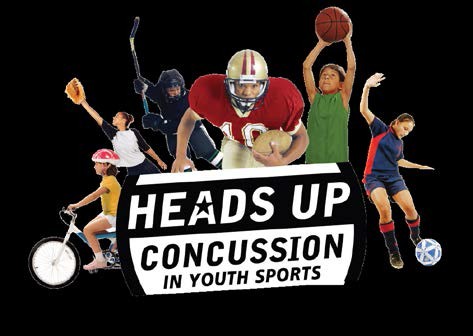


Yes How many times has someone given you “Heads Up” information in the past year? ____ _____
No
Unsure
Have you ever seen any posters about concussion?
Yes Did these posters have the Heads Up logo? (See above)
Yes
No
Unsure
No
Unsure
Have you learned about sports concussion on your own from any of the
following sources (check all that apply)?
Online video
Online news
Online blog
Online medical website (Web MD, Medline plus, Mayo clinic)
ESPN/Sports center
TV or radio
Went to a talk
Discussion with physician
Printed material (newspaper, magazine, etc)
“Heads Up” from the Centers for Disease Control and Prevention (CDC)
State athletic association website
Other______________
Did you have to sign any forms about concussion in the past year in order for your child to play their sport?
Yes
No
Unsure
This section covers general concussion knowledge.
There is a possible risk of death if a second concussion occurs before the first one has healed.
True
False
Unsure
People who have had one concussion are more likely to have another concussion.
True
False
Unsure
In order to be diagnosed with a concussion, you have to be knocked out.
True
False
Unsure
A concussion can only occur if there is a direct hit to the head.
True
False
Unsure
Being knocked unconscious always causes permanent damage to the brain.
True
False
Unsure
Symptoms of a concussion can last for several weeks.
True
False
Unsure
Sometimes a second concussion can help a person remember things that were forgotten after the first concussion.
True
False
Unsure
After a concussion occurs, brain imaging (e.g., CAT Scan, MRI, X-Ray, etc.) typically shows visible physical damage (e.g., bruise, blood clot) to the brain.
True
False
Unsure
If you receive one concussion and you have never had a concussion before, you will become less intelligent.
True
False
Unsure
After 10 days, symptoms of a concussion are usually completely gone.
True
False
Unsure
After a concussion, people can forget who they are and not recognize others but be perfect in every other way.
True
False
Unsure
Concussions can cause emotional symptoms (such as sadness or crying).
True
False
Unsure
An athlete who gets knocked out after getting a concussion is experiencing a coma.
True
False
Unsure
There is rarely a risk to long-term health and well-being from multiple concussions.
True
False
Unsure
This last section covers attitudes about concussion.
I would continue playing a sport while also having a headache that resulted from a minor concussion.
Strongly agree
Agree
Neither agree nor disagree
Disagree
Strongly disagree
I feel that coaches need to be extremely cautious when determining whether an athlete should return to play.
Strongly agree
Agree
Neither agree nor disagree
Disagree
Strongly disagree
I feel that concussions are less important than other injuries.
Strongly agree
Agree
Neither agree nor disagree
Disagree
Strongly disagree
I feel that an athlete has a responsibility to return to a game even if it means playing while still experiencing symptoms of a concussion.
Strongly agree
Agree
Neither agree nor disagree
Disagree
Strongly disagree
I feel that an athlete who is knocked unconscious should be taken to the emergency room.
Strongly agree
Agree
Neither agree nor disagree
Disagree
Strongly disagree
You are finished! Thank you for filling out this survey.
Screenshot

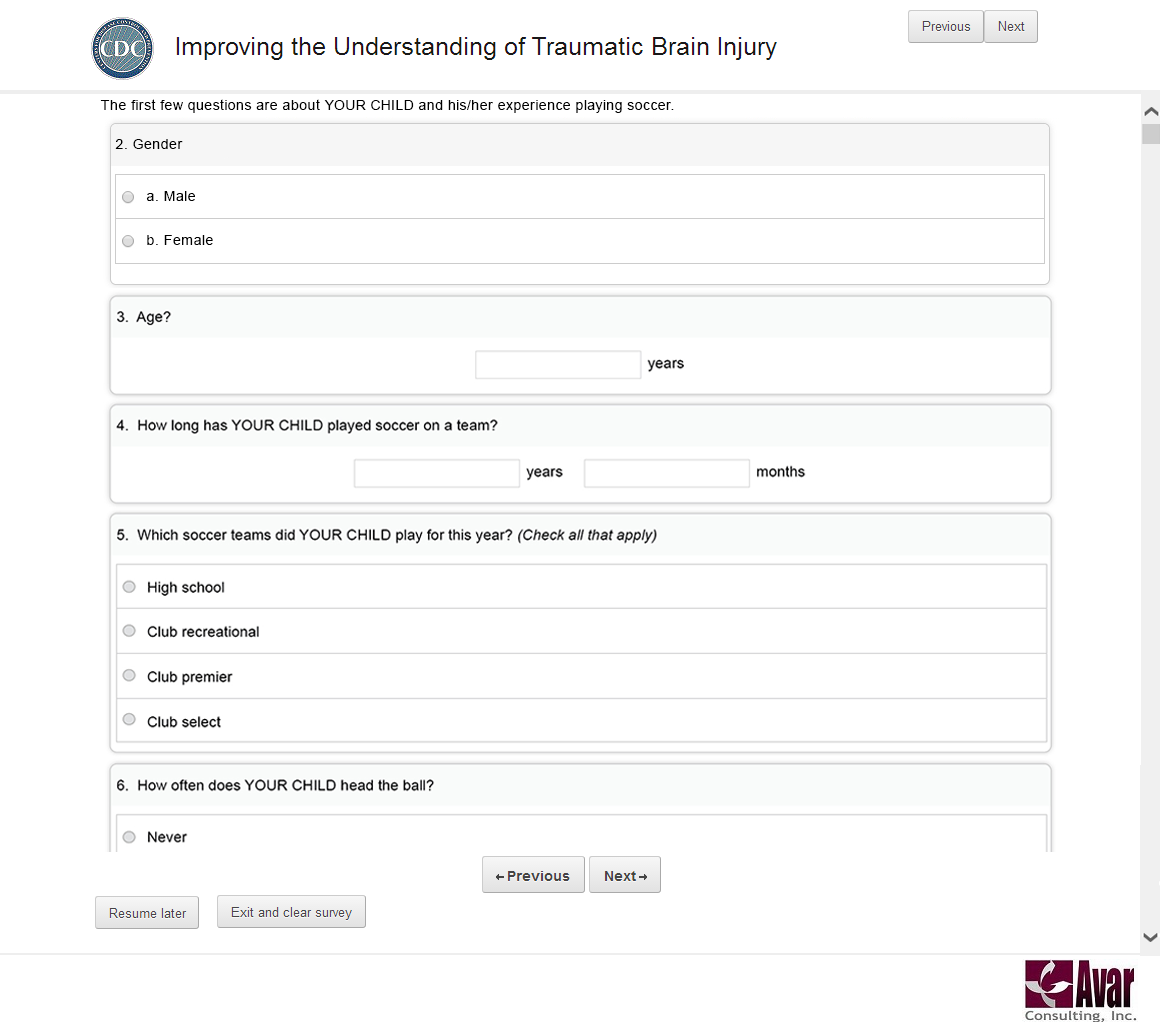
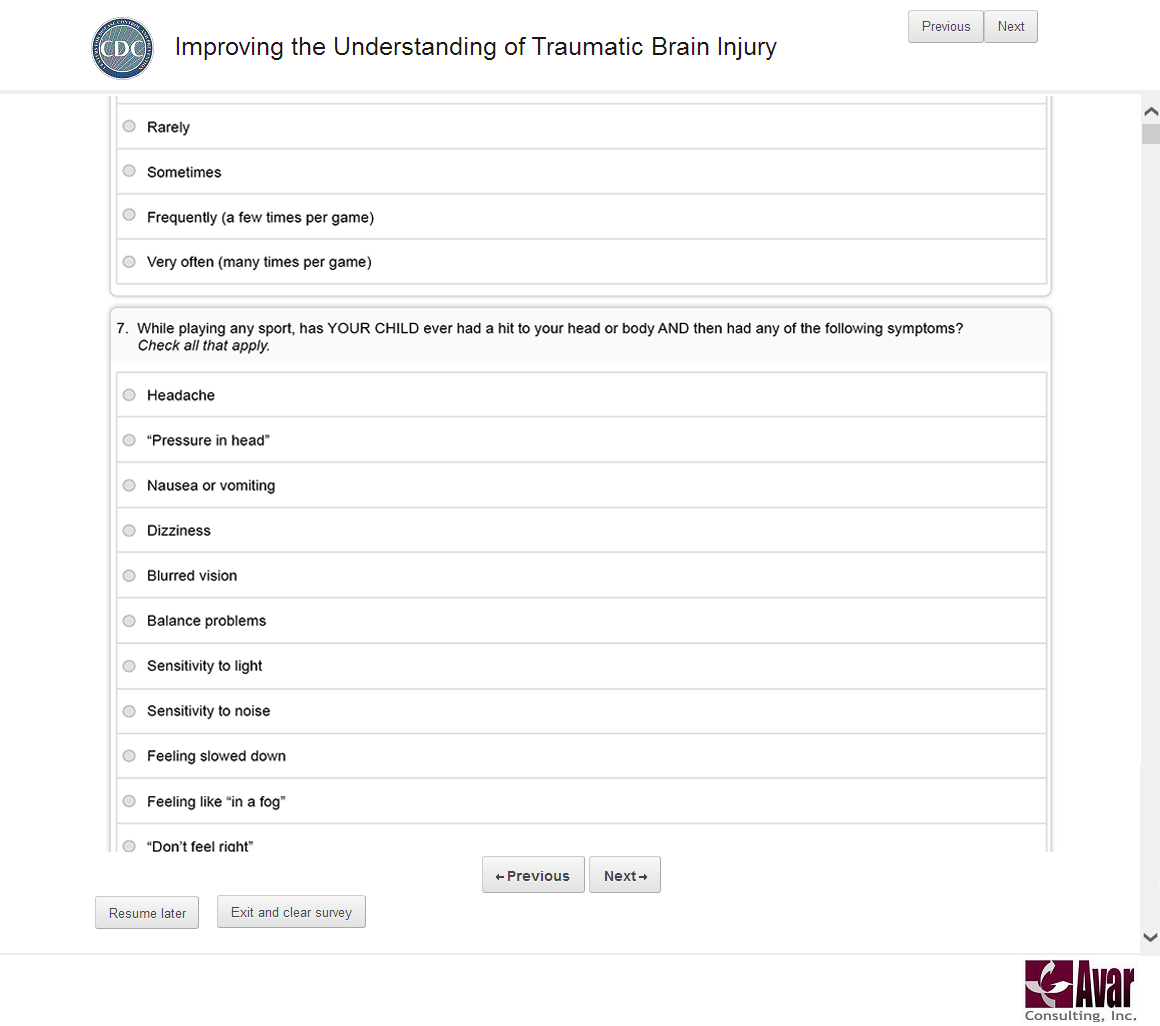
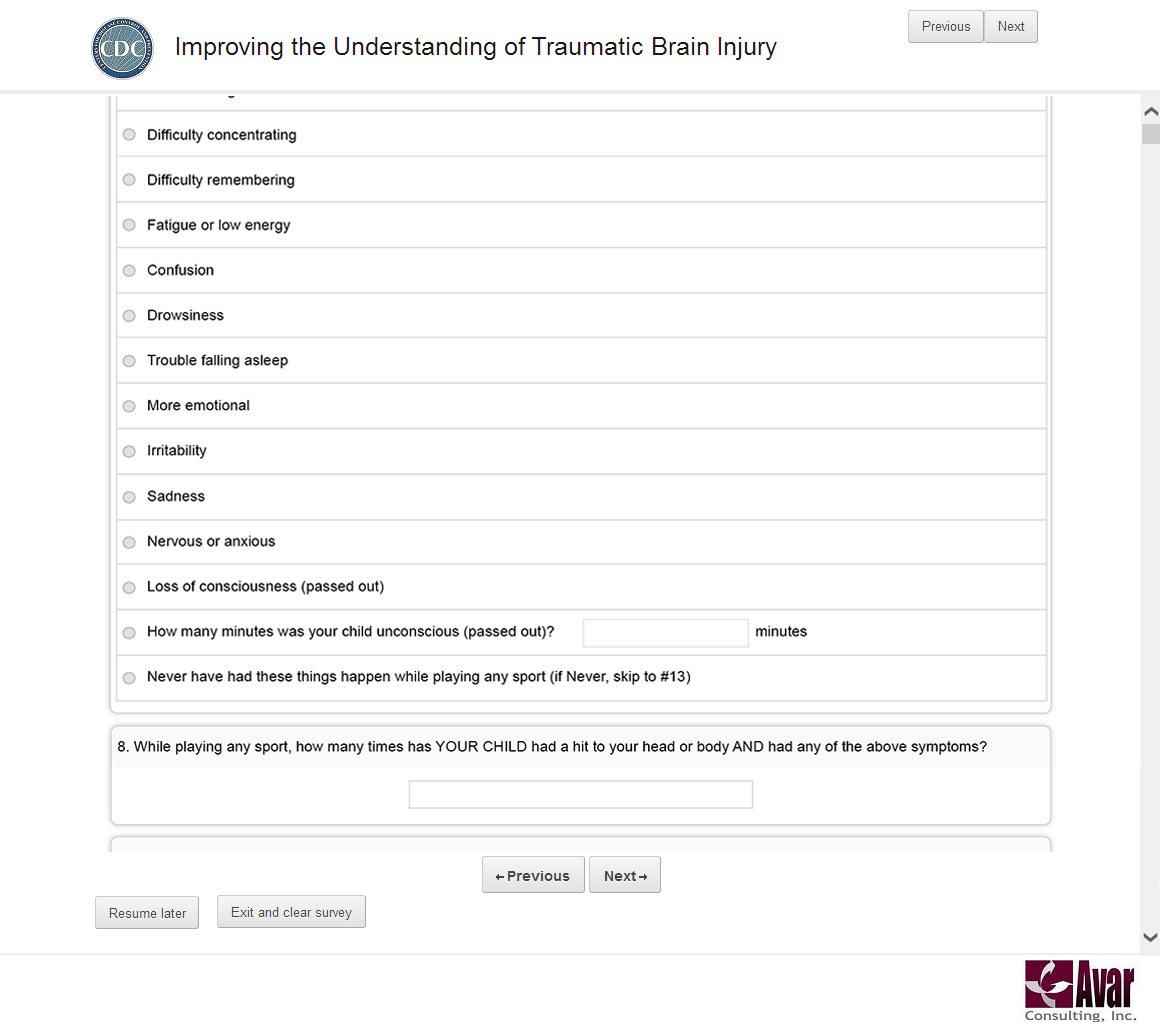
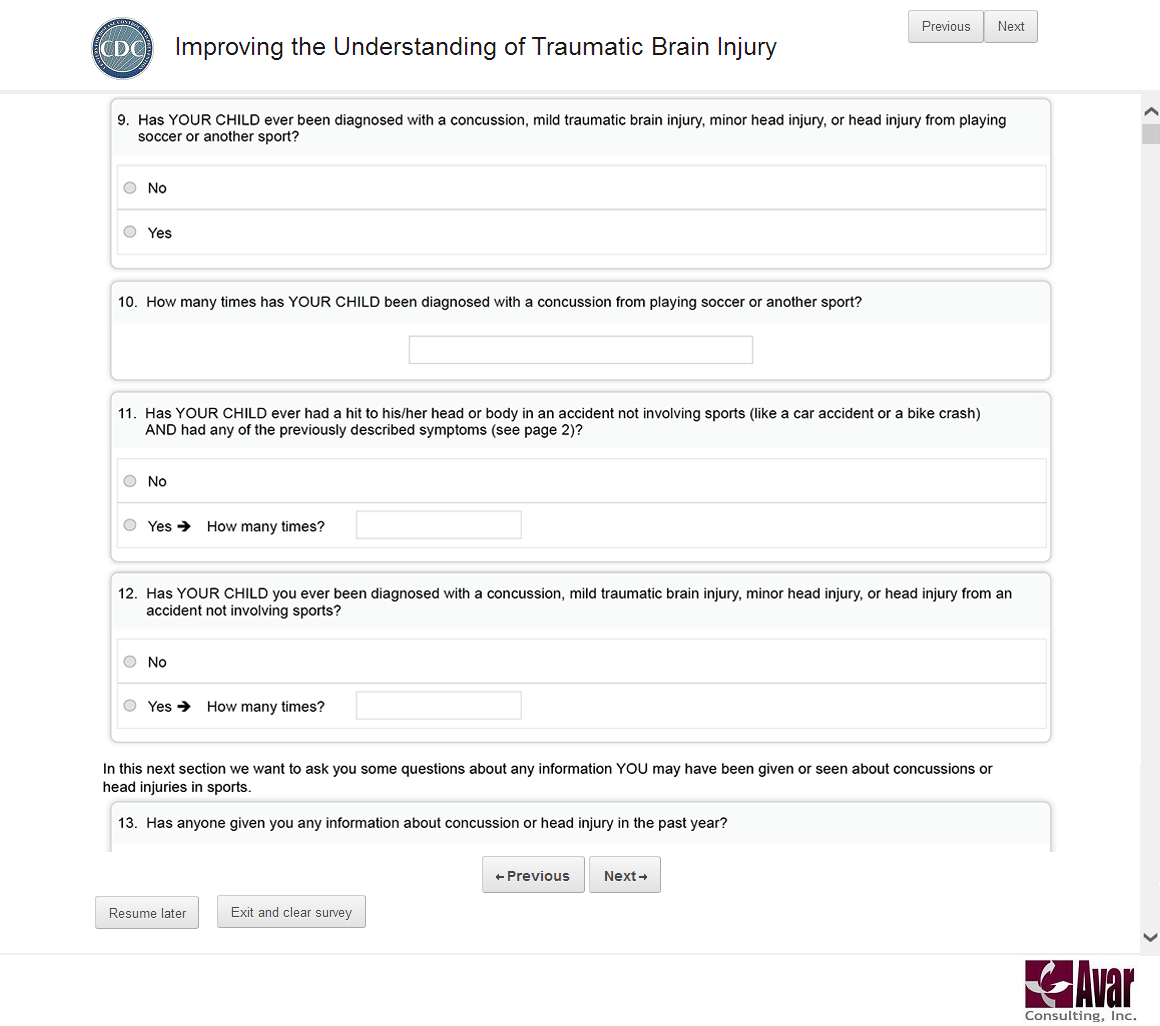
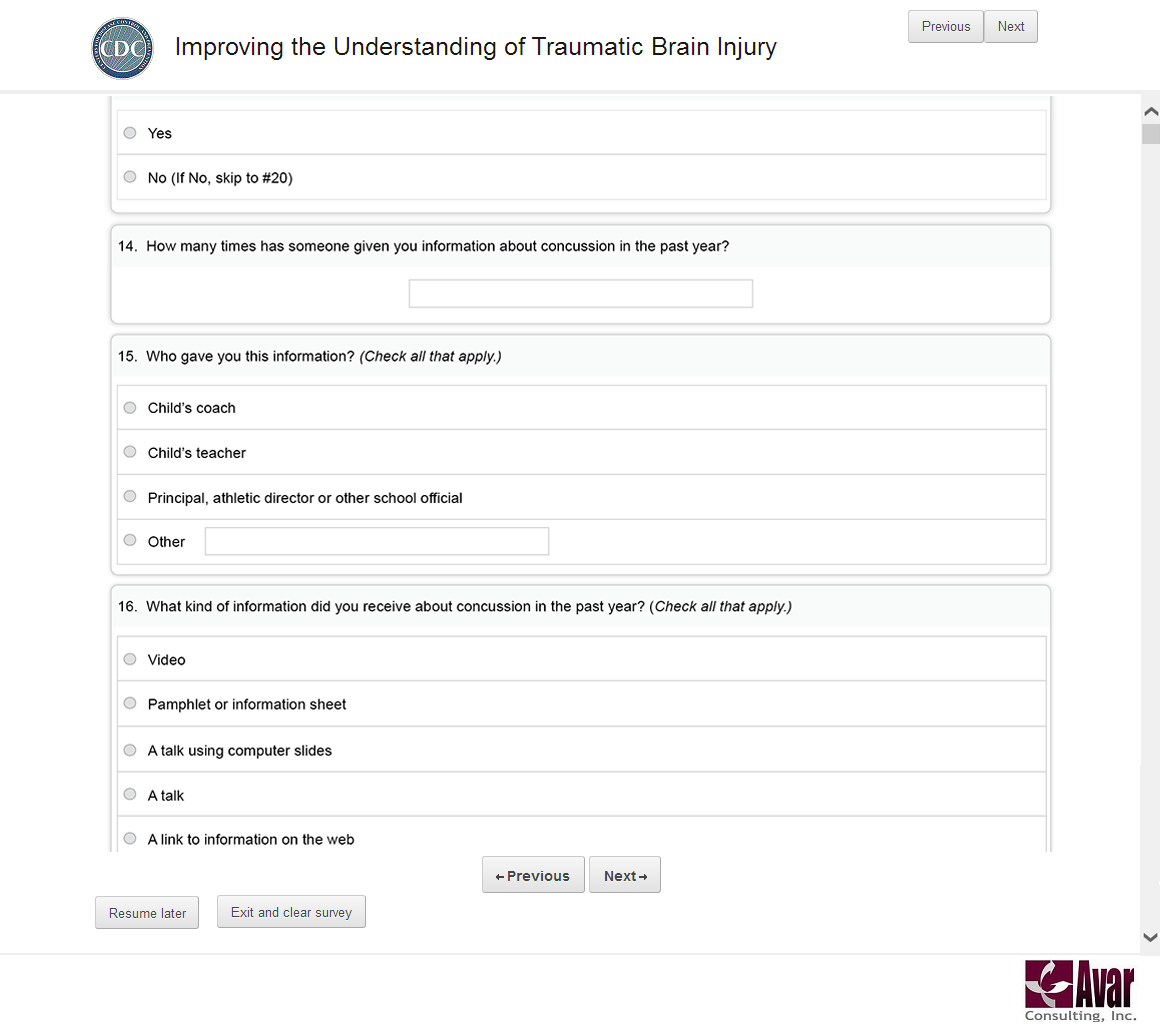
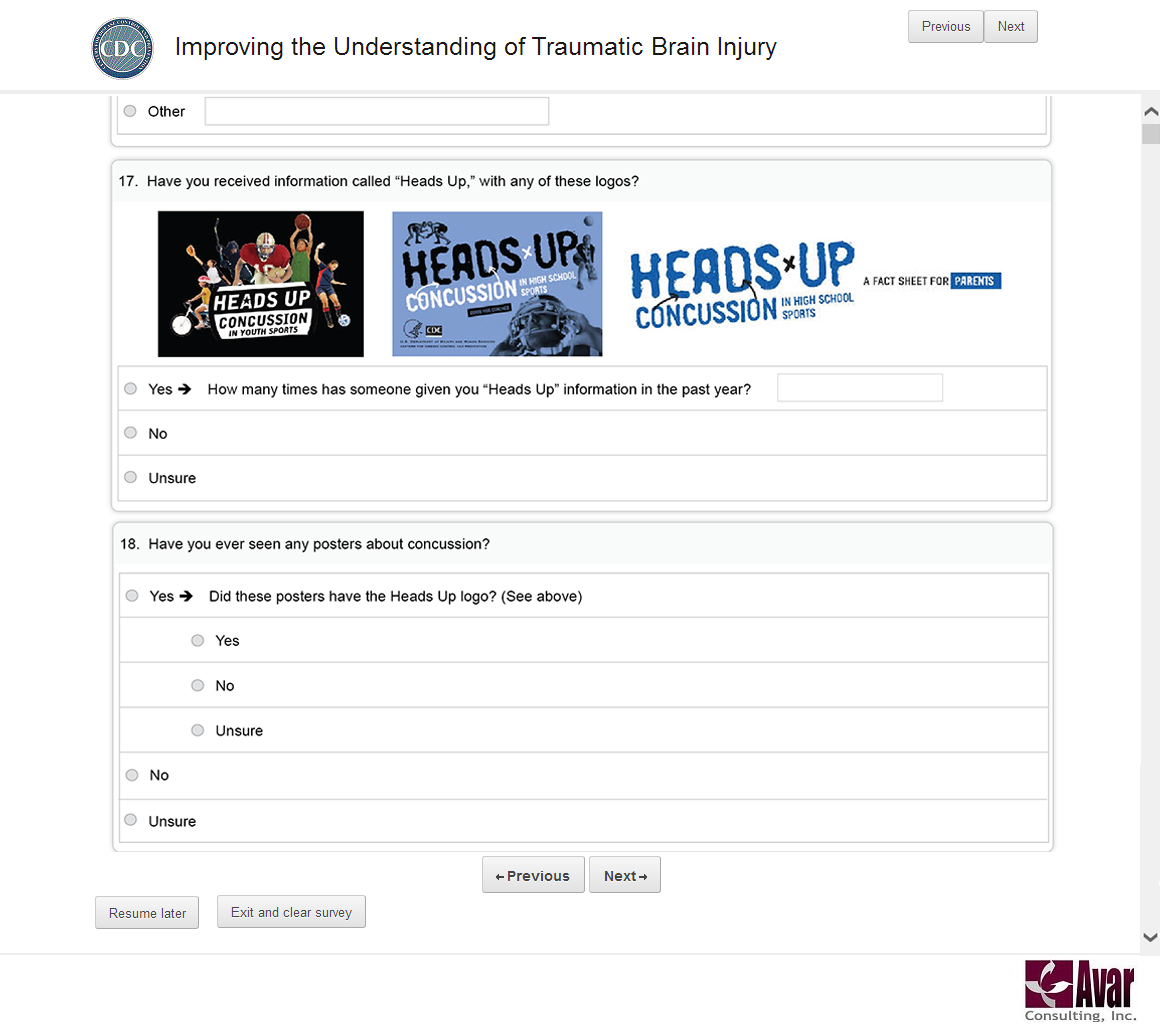


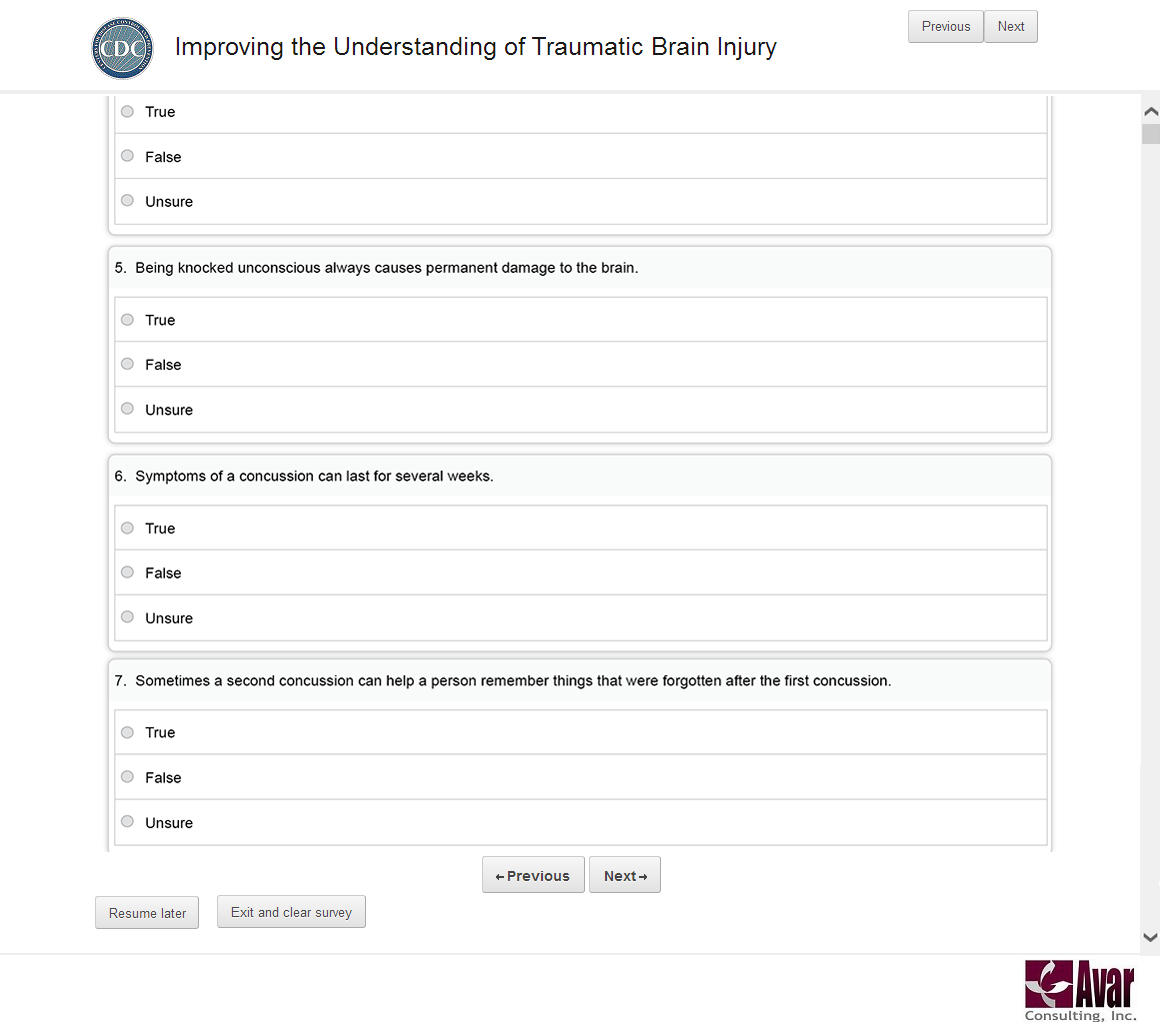
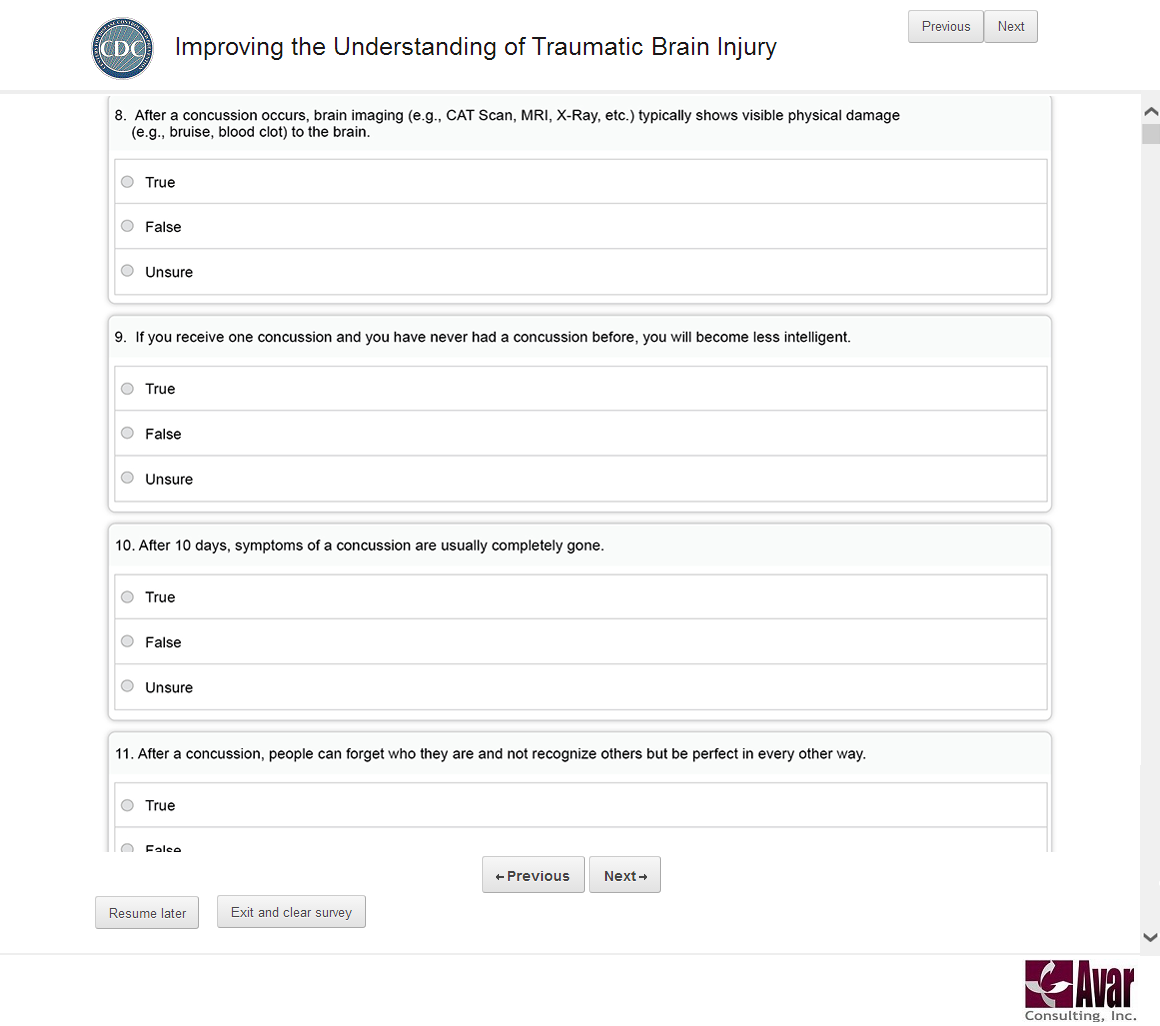
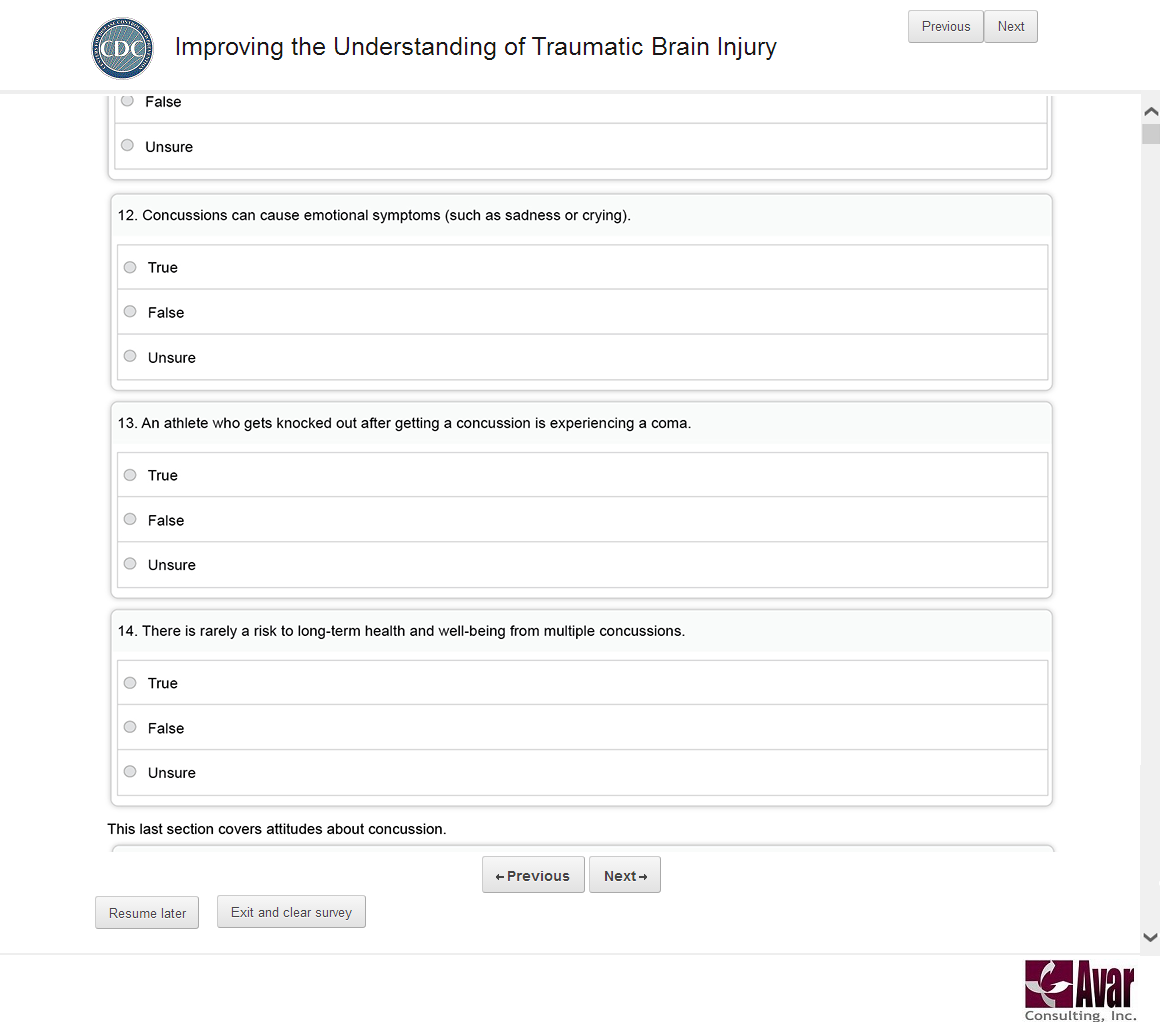
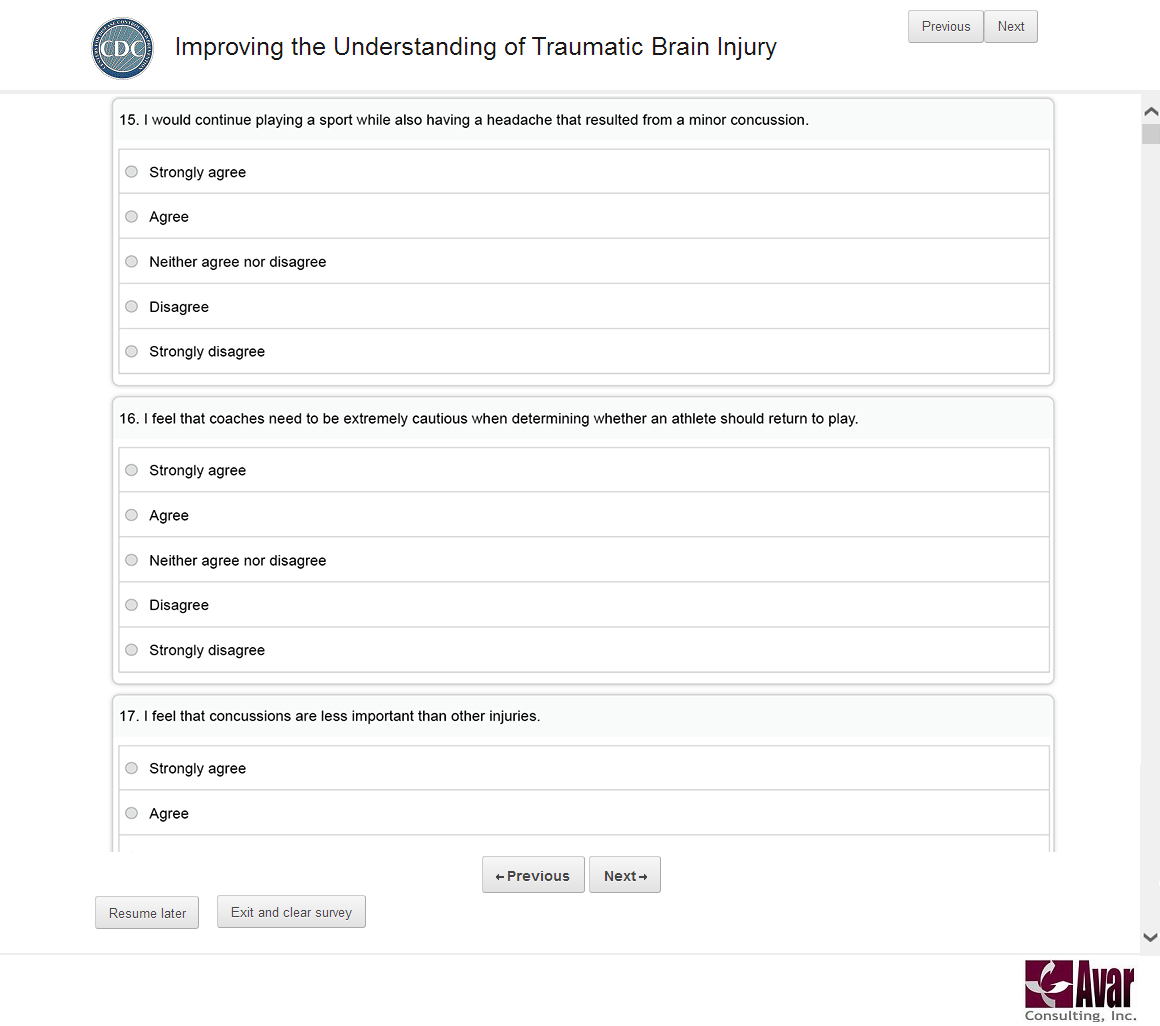

| File Type | application/msword |
| File Title | Girls Soccer Survey |
| Author | Melissa Schiff |
| Last Modified By | CDC User |
| File Modified | 2015-03-23 |
| File Created | 2015-03-23 |
© 2026 OMB.report | Privacy Policy